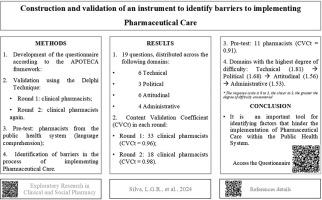构建和验证一种工具,以确定实施药物护理的障碍
IF 1.8
Q3 PHARMACOLOGY & PHARMACY
Exploratory research in clinical and social pharmacy
Pub Date : 2024-10-18
DOI:10.1016/j.rcsop.2024.100529
引用次数: 0
摘要
背景药物护理是公共卫生系统中初级卫生保健中需求量很大的一种专业做法。因此,有必要开发和验证一种工具来评估这一过程中的障碍。方法研究分三个阶段进行:首先,根据 APOTECA 框架开发问卷,该框架包括态度、政治、技术和行政领域。其次,采用德尔菲技术对问卷内容进行验证,内容效度系数大于或等于 0.8 即可接受。第三,对公共卫生系统内从事初级卫生保健工作的药剂师进行了预测试。结果表明,该工具经过两轮评估后得到了验证,第一轮有 33 位专家参与,内容效度系数达到 96%;第二轮有 18 位专家参与,内容效度系数达到 98%。在第三阶段,对初级保健药剂师进行了预测试,结果显示总内容效度系数为 91%。问卷的最终版本包含 19 个问题,并采纳了改进建议。药剂师的回答表明,技术问题是阻碍实施的最大障碍,其次是政治、态度和行政问题。本文章由计算机程序翻译,如有差异,请以英文原文为准。

Construction and validation of an instrument to identify barriers to implementing pharmaceutical care
Background
Pharmaceutical Care is a professional practice in high demand for implementation in Primary Health Care within the Public Health System. Consequently, it was necessary to develop and validate an instrument to assess the obstacles to this process.
Methods
A methodological study was conducted in three stages: first, the questionnaire was developed based on the APOTECA framework, which includes Attitudinal, Political, Technical, and Administrative domains. Second, the content was validated using the Delphi Technique, with a content validity coefficient greater than or equal to 0.8 considered acceptable. Third, a pre-test was conducted with pharmacists working in Primary Health Care within the Public Health System. After validation, the instrument was administered to pharmacists participating in a training and support project for the implementation of Pharmaceutical Care.
Results
The results indicated that the instrument was validated after two rounds of evaluation, with the first round involving 33 experts achieving a total content validity coefficient of 96 %, and the second round involving 18 experts achieving a total content validity coefficient of 98 %. In the third stage, the pre-test with Primary Health Care pharmacists resulted in a total content validity coefficient of 91 %. The final version of the questionnaire, which incorporated suggestions for improvements, included 19 questions. When answered by pharmacists, the responses indicated that Technical questions were the most significant barrier to implementation, followed by Political, Attitudinal, and Administrative questions.
Conclusion
The validation of this instrument provides an important tool for identifying factors that hinder the implementation of Pharmaceutical Care within the Public Health System.
求助全文
通过发布文献求助,成功后即可免费获取论文全文。
去求助
来源期刊

Exploratory research in clinical and social pharmacy
Public Health and Health Policy
CiteScore
1.60
自引率
0.00%
发文量
0
审稿时长
103 days
 求助内容:
求助内容: 应助结果提醒方式:
应助结果提醒方式:


